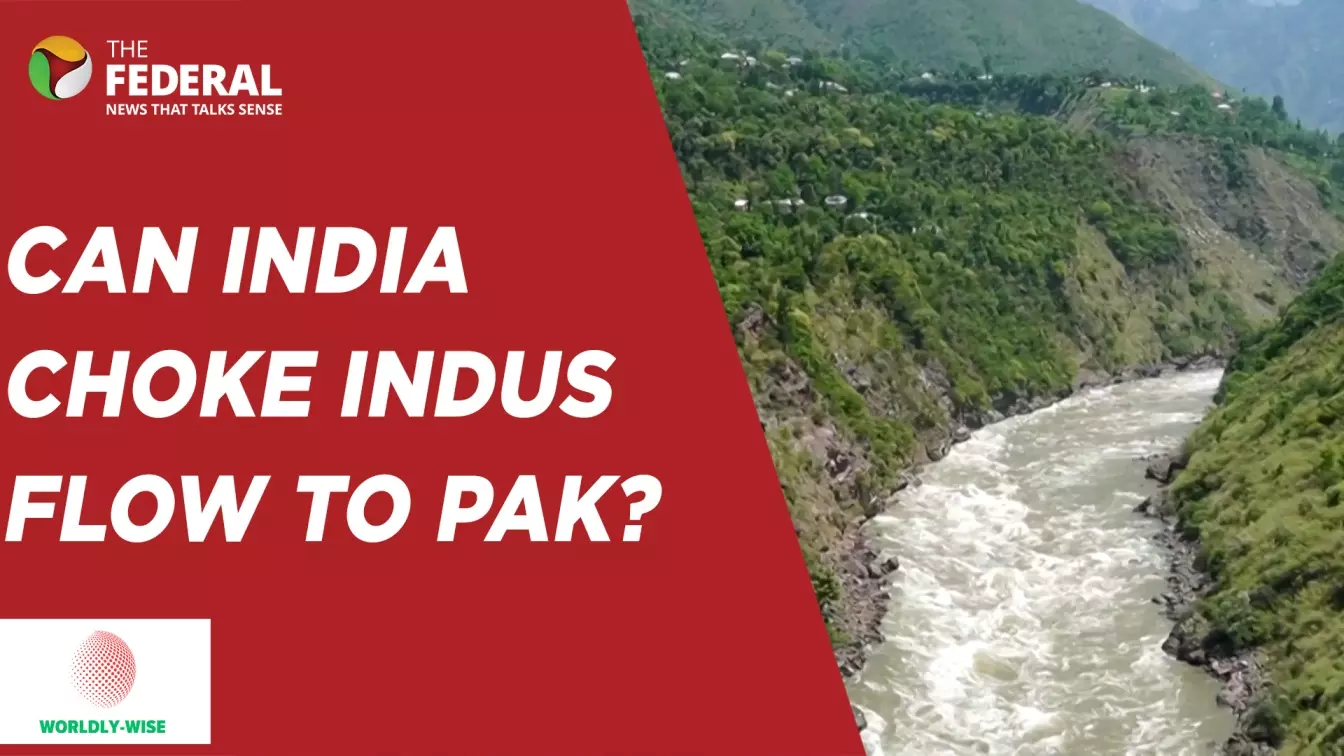
Mohan Katarki exclusive interview
Mohan Katarki Exclusive | India-Pak Indus Water Treaty caught in crossfire
Senior Supreme Court advocate and river waters expert Mohan Katarki explains why suspending the Indus Water Treaty won’t dry Pakistan—yet. Can India really stop the flow?

India’s recent suspension of the Indus Water Treaty has drawn sharp attention amid escalating tensions with Pakistan. In this exclusive conversation on Worldly Wise, senior Supreme Court advocate Mohan Katarki explains the legal, environmental, and geopolitical implications of the move and what lies ahead for both nations.
What is the Indus Water Treaty, and how did it come about?
Katarki: The Indus Basin originates in Tibet, with a part flowing through Afghanistan. About 90% of the catchment area lies in India and Pakistan. The basin has six rivers—Indus, Jhelum, Chenab (western), and Sutlej, Ravi, and Beas (eastern).
The Treaty was signed in 1960, post-Partition. India was granted control over the eastern rivers (about 35 MAF of water), while Pakistan received rights to the western rivers (around 100 MAF). India had limited use rights over the western rivers, allowing for irrigation and non-consumptive hydroelectric use.
Was there ever a mechanism to review or terminate the treaty?
Katarki: No. The treaty lacks a clause for unilateral termination or scheduled review. Unlike many international treaties, it doesn't stipulate renegotiation after a fixed duration. There’s only a vague indication in Clauses 7 and 12 suggesting cooperation for future changes, but nothing enforceable.
So why did India agree to it, and did it get a fair deal?
Katarki: At the time, India lacked the infrastructure and technology to utilise the western rivers. Given its needs and constraints, the treaty served India well in 1960. But over the decades, things changed—climate change reduced glacial flows in the eastern rivers, and interstate water demands in India grew. India now feels the treaty is imbalanced and outdated.
What does it mean that India is “suspending” the treaty?
Katarki: Legally, the treaty cannot be suspended as it lacks such a clause. However, under international customary law, a sovereign nation can withdraw or suspend a treaty based on the doctrine of rebus sic stantibus—meaning changed circumstances.
Also read: Pahalgam terror attack: Is war with Pakistan the only option? Worldly Wise
Although the Vienna Convention on the Law of Treaties codifies this, it doesn’t apply retroactively to the Indus Treaty, which predates it. Still, India is arguably within its rights to act on changed geopolitical and environmental realities.
Has India stopped water flow to Pakistan?
Katarki: No. That’s a common misconception. Water flows by gravity, and without dams to stop it, India can’t actually halt the flow. Currently, India has less than 1% of storage capacity on the western rivers—0.94 MAF out of 100 MAF—so any declaration is symbolic unless backed by infrastructure.
Even if India does divert 5–10 MAF in the future, it won't substantially impact Pakistan, which receives 135 MAF overall (including from the Kabul River and within its own territory).
Can Pakistan take legal action?
Katarki: Not easily. International law doesn’t provide for compulsory adjudication. The International Court of Justice (ICJ) needs both parties to agree to its jurisdiction, which India hasn't extended to Pakistan. Arbitration under the treaty doesn’t cover termination either.
The UN Security Council could be approached, but unless there’s proof of harm or a compelling legal basis, it's unlikely to act. The World Bank, which facilitated the treaty, has no formal role at this stage either.
So what could trigger actual negotiations?
Katarki: Only the construction of large dams by India that materially alter flows could provoke Pakistan into negotiations. Without concrete action, Pakistan has no incentive to come to the table.
However, diplomatic solutions remain preferable. If both sides view the treaty purely as a water-sharing issue—without linking it to terrorism or Kashmir—modification is possible.
What's the geopolitical significance?
Katarki: India has already proposed renegotiation, citing a lack of cooperation and broader tensions, including Pakistan’s export of terrorism. But mixing water issues with security concerns complicates diplomacy.
Ultimately, water serves people, not governments. Both sides have much to gain from practical cooperation. India could use more water; Pakistan won’t lose much from modest diversions. A reasonable renegotiation is in everyone’s interest.
And finally, how much of the western rivers flow through India?
Katarki: They flow through Jammu and Kashmir—none of the western rivers flow outside Kashmir before entering Pakistan.
The content above has been generated using a fine-tuned AI model. To ensure accuracy, quality, and editorial integrity, we employ a Human-In-The-Loop (HITL) process. While AI assists in creating the initial draft, our experienced editorial team carefully reviews, edits, and refines the content before publication. At The Federal, we combine the efficiency of AI with the expertise of human editors to deliver reliable and insightful journalism.

